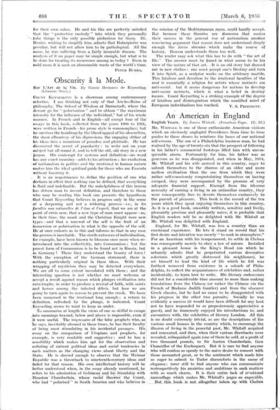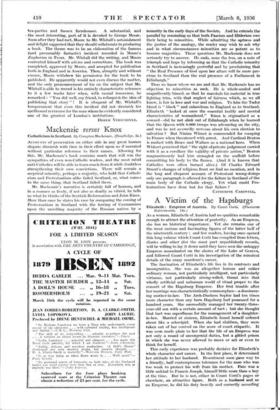An-American in England
English Years. -By :Tames *hitall: (Jonathan Cape. 12s. ad.) MR. AVIIITALL is one of those enthusiastic American visitors which an obviously anglophil Providence from time to time guides to these shores to reinforce the bases of our national self-esteem. The son of a Philadelphia business man, he had realised by the age of twenty-six that, the prospect of following in his father's commercial footsteps filled him with uncon- querable alarm. Fortunately for him, his father was as generous as he was disappointed, and when in May, ,1914, Mr. Whitall and his wife arrived in this country, eager to submit themselves to the charms of an older and more mellow civilisation than the one froin which 'they were rather self-consciously congratulating themselves on haYing escaped, they were accompanied by the promise of very adequate financial support. Exempt from the irksome necessity of earning a living in an unfamiliar country, they were consequently free to, devote themselves exclusively to the pursuit of pleasure. This book is the record of the ten years which they spent enjoying themselves in this country. As it is a good book, smoothly written, sensitive and lively, pleasantly precious and pleasantly naive, it is probable that . English readers will be as delighted with Mr. Whitall as Mr. Whitall was delighted with England.
England, for Mr. Whitall, was less a country than an emotional experience: He lets it stand on record that 'his first desire and intention was merely " to soak in atmosphere." For an American with his temperament, to settle in Chelsea was consequently merely to obey a law of nature. Instilled in a pleasant house in the King's Road (on which : he urbanely admits that he perpetrated various decorative solecisms which greatly distressed his neighbours), he set himself to lead the kind of life which he felt was furthest removed from existence in a suburb of Phila- delphia, to collect the acquaintances of celebrities and, rather incidentally, to learn, how to write. HIS literary endeavours did not for a considerable time amount to more than making translations from the Chinese (or rather the Chinese via the French of Maclaine Judith Gautier). and from the obscurer Greek classics, but he had no cause to be disappointed' with his progress in the other two Pursuits: Socially he' was evidently a success (it would have been difficult for any host not to have responded to so preposterously appreciative a guest), and he immensely enjoyed his introduetiOns to, and encounters with, the celebrities of literary London. All this is no doubt extremely trivial, as are the descriptions of the various small houses in the country which, to encourage the illusion of living in the peaceful past, Mr. Whitall acquired and renovated, and then, when their various drawbacks were revealed, relinquished again (one of them he sold, at a profit of two thousand pounds, to Sir Austen Chamberlain, then Chancellor' of the Exeheqiier). BUt it is rare-AO find anyone who will confess so openly to the naive desire to consort with those accounted great, or In the sentiment which made. him so eager to submit to Tudor discomforts in the cause of elegance; rarer still to find anyone who can communicate testrospeetively his anxieties and ambitions in such matters with so much charin. It is their entire lack of eraotional Camouflage which makes Mr. Whitall's pages so -enjoyable. .,But_this._ honk is not altageTher taken up with cheliea
tea-parties and Sussex farmhouses. A substantial, and - the most interesting, part-of it-is devoted to George Moore. - Soon after they had met, Moore to Mr. Whitall's astonishment and delight suggested that they should collaborate in producing a book. The theme was to be an elaboration of the famous (and presumably fantastic) incident recorded in Moore's Euphorion in Texas. Mr. Whitall did the writing, and Moore contented himself with advice and corrections. The book was completed, approved by Moore, and accepted for publication both in England and in America. Then, abruptly and without excuse, Moore withdrew his permission for the book to be published. He apparently would not even discuss the matter, and the only pronouncement of his on the subject that Mr. VVhitall is able to record is his entirely characteristic reference to it a few weeks later when, with casual innocence, he remarked : "You did well, my friend, to relinquish the idea of publishing that story " ! It is eloquent of Mr. Whitall's temperament that even this incident did not diminish his spellbound reverence for the man whom he evidently considered one of the greatest of London's institutions.
DEREK VERSCHOYLE.

















































 Previous page
Previous page